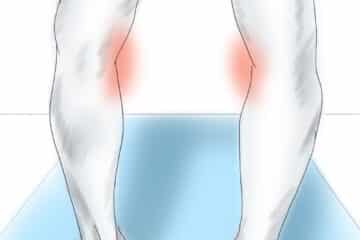
Do I need a knee replacement?
I don’t know .. do you think it’s time for a knee replacement?
I can not tell you how often I have this discussion with people. Let’s just put it out there… and I will repeat this often. For 99% of you, the decision to proceed with a knee replacement is yours. It is not up to me as the surgeon to decide. Your surgeon should help guide the decision making process, but we should not be telling you that you need a knee replacement. Why is that? Well… osteoarthritis of the knee is a degenerative, inflammatory disease that affects our joints. There are some people who have minimal pain despite horrible looking x-rays and there are those of you with terrible pain, despite reasonably good looking x-rays. That means that I can not look at an x-ray and tell you whether or not that person might benefit from a knee replacement. As I often say, we treat patients, not X-rays.
The decision to proceed with a knee replacement should be based on:
- Whether or not the pain is having a significant impact on your quality of life. Only you can determine that.
- Your goals are realistic … I can not tell you how many times I have seen people who only have pain when running or playing tennis and they think that a knee replacement is right for them.
- Your pain has not improved with non surgical management such as injections, PT, weight loss and exercise.
Having realistic goals about a knee replacement is critical. Most surgeons are trying to restore you ability to walk comfortably. We will allow you to play doubles tennis, swim, golf, etc… but that is icing on the cake. If you’re considering a knee replacement and your primary goal is to be able to jog once again, or play a second or third set of tennis then you should seriously consider waiting. The research shows that an uncomfortably high percentage of people who had a knee replacement are not very happy with the result. Much of that might be due to mismatched goals or expectations. Discuss your goals with your surgeon. Make sure you are both on the same page.
Why should I wait for my knee replacement?
Don’t get me wrong. For many people the results of a knee replacement are great. When properly done in the proper patient the results can be life changing. But… More than 10% of people are unhappy after a knee replacement. That is the reality of knee replacement surgery. You may have continued pain, despite a well done surgery. You may have an unknown allergy to metal and experience pain. You may have pain for no known reason. These can be very challenging situations. But if you truly needed the knee replacement to begin with, and you made an informed decision to proceed, and it was your decision to proceed, then it might be a little easier to deal with complications should they arise.
TREATMENT ALTERNATIVES FOR EARLY KNEE ARTHRITIS
Risks of knee replacement surgery
The overall complication rate of knee replacement surgery is not very high… but if a complication occurs in you, then it is a very real problem.
The risks of a knee replacement include, but are not limited to:
Do you have questions regarding an Orthopedic injury or longevity?
Do you want to talk to an expert who can listen to you for 45-60 minutes and explain the options in detail?
Dr. Howard Luks offers remote guidance sessions to review your X-ray or MRI images and explain your options.
Dr. Luks has also received hundreds of requests for educational sessions on the topics discussed in his book, Longevity Simplified.
- infection- which could require the removal of the new knee.
- stiffness
- persistent pain- usually in the front of your knee.
- feeling of instability or giving way
- nerve injury
- arterial injury
- numbness on the outer or lateral side of your knee.
- DVT or a blood clot in the leg which could travel to your lungs and cause a pulmonary embolus.
- Heart issues such as a heart attack or arrhythmia like Afib are rare
- inability to return to certain sports or activities.
So .. again, in the right circumstances, a knee replacement might be your best option to alleviate severe pain that significantly impacts your quality of life. For many people it is a very successful operation. For some of you it will not be a successful operation. The more you know, the better informed your decision is, the more likely you are to understand the risks and potential complications of your decision to move forward.













marion connick
Going into surgery feeling reassured and confident after playing your video on knee replacement again
Jim Sievers
Dr. Luks,
Wow! A great informative video that solved a lot misconceptions regarding bone on bone needing immediate corrective surgical action, exercise helping alleviate the pain and when is the right time for surgery.
Im 64 years old with a soar knee for years with bone on bone. I only have pain mostly when Im walking and its only a 2 out of 10 with Aleve working wonders for pain management. My biggest concern is I walk kinda funny as if the leg is shorter or may be because the knee kinda pops around. Anyway Im waiting if my pain reaches a 5 or 6. Will this cause hip damage as the Monday night dinner boys have told me.
Thank you!!
I’m glad that you found it useful.
I’m not sure that having a knee replacement is worth the risk when your pain is 2/10 and you’re concerned it might throw off your hip.
There is no evidence to prove that theory. Although it is not uncommon for people to have both hip and knee arthritis at the same time. So you
might already have some degenerative changes there that haven’t yet reached the threshold of causing pain.
Something to discuss with your Ortho the next time you see them.
Marion Connick
A well informed article for any upcoming surgery.
Thank you! I’m glad that you enjoyed it :-)
Arlene Chemnitz
I finally decided and I am going forward. I don’t have pain when sitting at a computer, but I am 81 years old, have had all the injections and fluid removals, did have an MRI and my doctor said “Arlene, I looked at your MRI and it wasn’t pretty. There is nothing more I can do for you except give you pain medication”. Well, I’m not having it until April, because of the holidays, plus I want to be able to go outdoors and since I decided, now it seems to be worse. But, I am going to a doctor who is using the 3D printer and I think the procedure is called NAVIA – something like that, but I watched his seminar on it and also am going to have a consult with him in a couple of weeks, so I am finally confident about going forward. Thanks for all your posts, I enjoy reading them and was thinking of going with the arterial embolization, but now decided that it is just too late for that. So onward and hope it turns out well for me! Again thanks for posting the articles. Arlene
Arlene… That was very kind of you to reach out. It’s nice to know that these articles are useful :-)
I think your thought process is very sound.
I wish you the best of luck with your knee replacement procedure!
Howard Luks